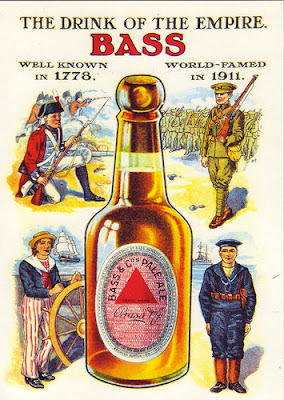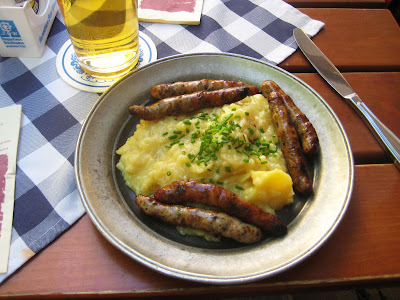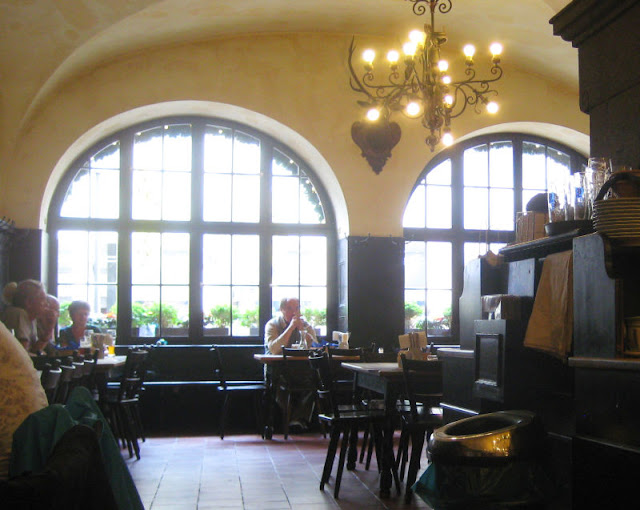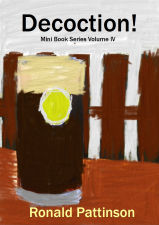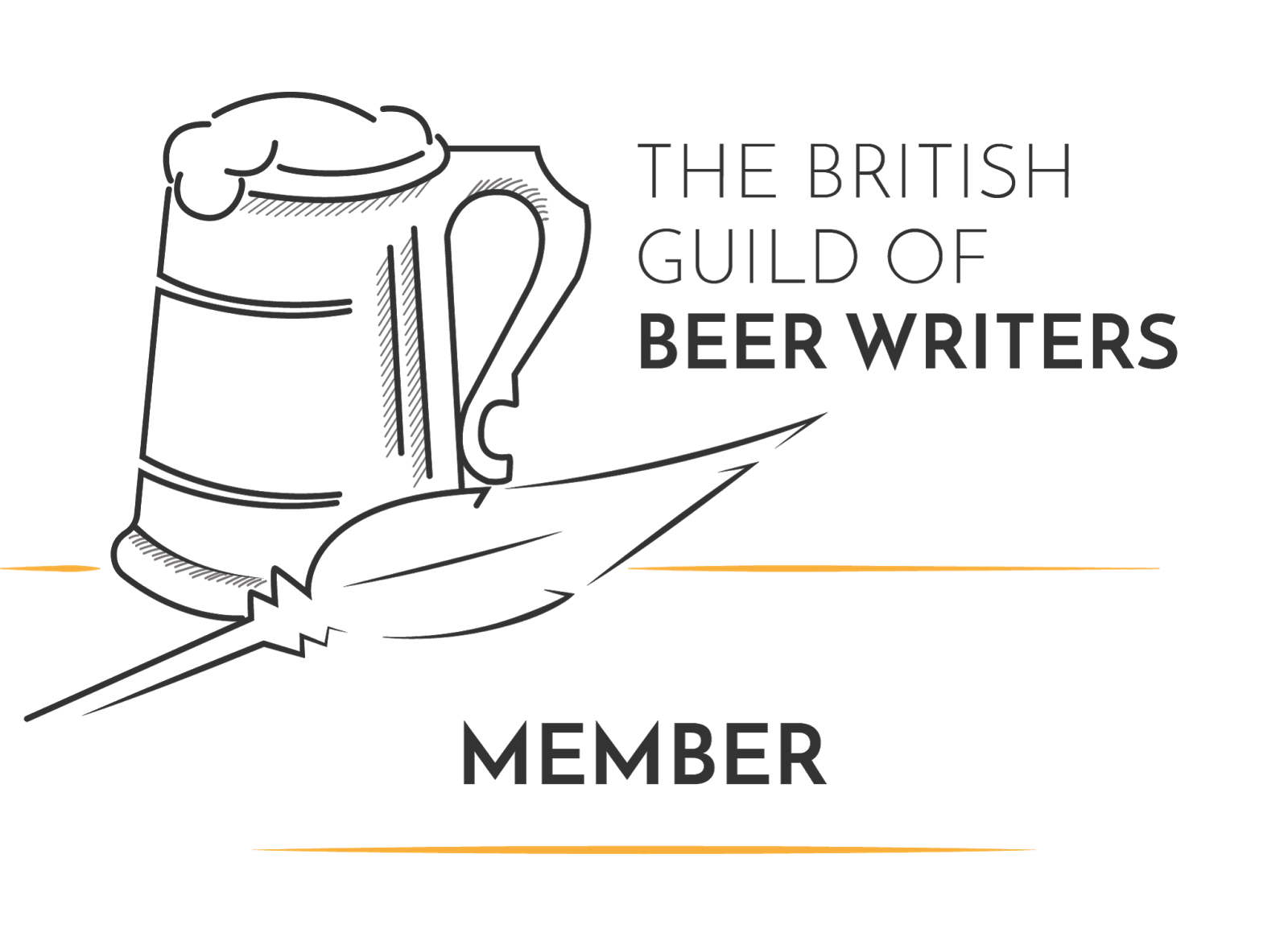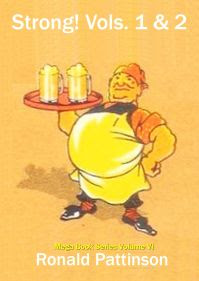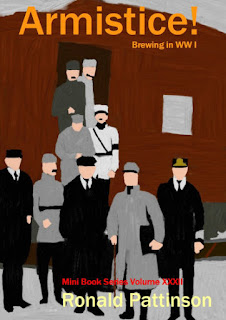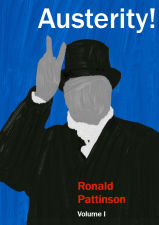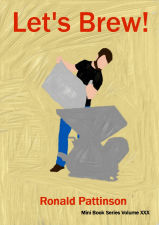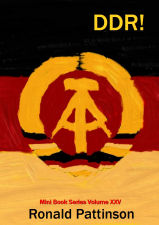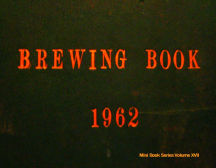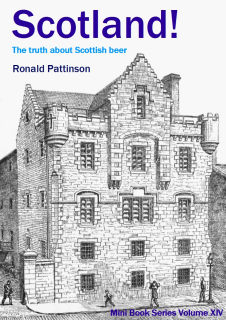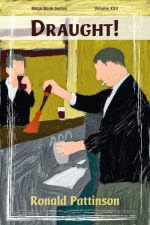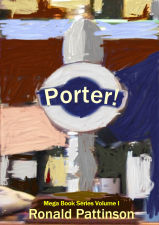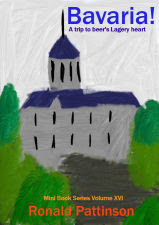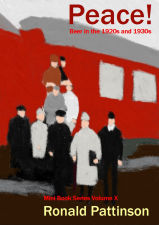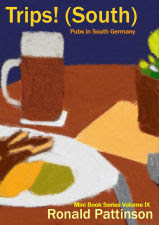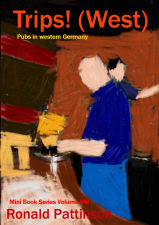Tuesday 31 July 2012
Leeds
I'm in Leeds for a few days with the family. A chance to wallow in nostalgia, or so I thought*. I'm a decade or two too late.
We're staying in an apartment just south of the river. Opposite the Tetley's brewery, of what was it. From my bed I can watch heavy machinery chopping and grinding the last pieces of the brewery into dust. There's some sort of metaphor there.
It's much the same in town with Tetley's beer. Some run-down or derelict pubs still bear Tetley's signage, but the majority of their former tied houses have no sign of the Tetley name. Only one pub I've been in sold Tetley. OK, there's a much wider range of beer available now, but it still makes me feel sad.
On a happier note, Andrew's had his first pint in a British pub. A pint of Guinness:
He could have startede with something worse. Much worse.
Guess what I've got planned this morning? An archive visit. Not to actually look at anything. I've an appointment for that Thursday morning. Hopefully to continue the Tetley theme of the trip.
* I lived in Leeds for seven years as a young man. I drank almost exclusively Tetley's Mild all that time.
We're staying in an apartment just south of the river. Opposite the Tetley's brewery, of what was it. From my bed I can watch heavy machinery chopping and grinding the last pieces of the brewery into dust. There's some sort of metaphor there.
It's much the same in town with Tetley's beer. Some run-down or derelict pubs still bear Tetley's signage, but the majority of their former tied houses have no sign of the Tetley name. Only one pub I've been in sold Tetley. OK, there's a much wider range of beer available now, but it still makes me feel sad.
On a happier note, Andrew's had his first pint in a British pub. A pint of Guinness:
He could have startede with something worse. Much worse.
Guess what I've got planned this morning? An archive visit. Not to actually look at anything. I've an appointment for that Thursday morning. Hopefully to continue the Tetley theme of the trip.
* I lived in Leeds for seven years as a young man. I drank almost exclusively Tetley's Mild all that time.
Demonstration against the 1908 Licensing Bill
Here's a newspaper report about the mass demonstration against the 1908 Licensing Bill in Hyde Park.
Special trains were arranged to ship people into London from all over the country. It was a massive event.
It would be interesting to know how many had actually turned out, a quarter or a half a million. Even the smaller number is still pretty impressive. The counter demonstration of temperance fanatics make it all sound rather modern.
I just realised what there's no mention of in the report: the police. They must surely have been a police presence at the event.
Special trains were arranged to ship people into London from all over the country. It was a massive event.
"NATIONAL PROTEST AGAINST "THE LOOT BILL."
"TRADE'S" DEFENCE.
MONSTER MEETING.
LANCASHIRE'S VOICE,
TRENCHANT SPEECHES.
Yesterday afternoon there was a great demonstration in Hyde Park organised by the "trade" against the Government's Licensing Bill. Speeches were delivered by members Parliament, prospective Parliamentary' candidates, licence holders and others from twenty platforms, and the following resolution was carried amid scenes enthusiasm
That this national demonstration protests against the provisions of the Licensing Bill on the grounds that it will fail to promote the cause of temperance, will violate those rights property which have hitherto been encouraged and recognised by the State, will tend, largely the increase unemployment and will interfere with the reasonable liberty of the community.
The demonstration, one of the largest of its kind ever held in London, was attended by brewers, hop merchants, publicans and representntives of all classes who interested the liquor trade. Over one hundred and seventy special trains brought demonstrators from all parts of England and Wales — from remote Carlisle, from Newcastle-on-Tyne, from North Wales, Penzance and Plymouth.
SCENES AT THE STATIONS.
The scenes at the railway stations were extraordinary nature, the usual quiet Sunday traffic having given way to continuous coming adult passengers, ninety-five per cent of whom were men, some wearing "broad sashes while in the coat of nearly every man was pinned the special badge in red, white, and blue colours, with the words "National Demonstration against Licensing Bill, Hyde Park, 27th of September, 1908" circling the motto "Liberty and honesty." The greatest part the passenger traffic was borne by the London; and North-Western, the Great Western, and Great Northern railways. As early as ten minutes to ten o'clock the first of the twenty-eight special trains reached Euston from Birmingham, and from that time onward to about three o'clock trains ran in at frequent intervals. It is estimated that this line alone brought eighteen thousand of the demonstrators. At Paddington demonstrators began to arrive at ten minutes to eleven. Traffic was very heavy, particularly from the South Wales and Devon districts. In all twenty-six trains were run. The Great Northern trains were similarly crowded. The Midland ran twenty-one specials, the London and South-Western seventeen, the Great Central fourteen, the South- Eastern and Chatham nine, the Great Eastern five, and the London, Brighton, and South Coast nine.
THE PROCESSION.
From fourteen different points in the Metropolis processions were formed, in which there were between eighty and ninety bands, some of which had competed the Crystal Palace festival Saturday, and over five hundred banners. Marching six abreast, the first lot of demonstrators reached the Park just after half-past three. The point of meeting was reached in front the Marble Arch, Hyde Park Corner, the Grosvenor Gate, and Albert Gate, and from the time the first contingents marched through till the moment of the resolution being put all had not arrived, some of the Lancashire and Cheshire parties having to struggle through a dense crowd at the Marble Arch at the moment the bugle sounded. The scene was remarkable one. It is impossible to compute the actual numbers present, which are variously placed between a quarter and half a million. It was not striking in a spectacular sense. Bands and banners were numerous, but amid such a throng they were comparatively lost, especially banners. Some thousands of the general public had arrived the scene long before the first contingent put in an appearance, and continued in vast numbers throughout the afternoon to pour on the scene.
The twenty platforms were arranged tha shape of an enormous horseshoe of irregular shape. Large as the crowd was, the greatest good order prevailed throughout the proceedings, though there was tangible evidence of opposition when the Plaistow Brotherhood marched in with their banners setting forth that their aim was "Fewer pubs, and happier homes." By the comparative few who could hear, the speeches were followed with close interest, while others who could not, carried heated arguments among themselves at numerous points. Punctually at a quarter past five o'clock the bugle rang out for the resolution to be put. There was remarkable scene of enthusiasm, a perfect roar of cheers rolling and echoing through the Park. Though the weather was threatening, rain, fortunately, with the exception of a few drops, held off, and thus in this respect the success the demonstration was greatly aided.
Hardly had the demonstration ended than rain began fall. The crowd left the park comparatively quietly, but some considerable time elapsed before the last the demonstrators got out so great was the press. Many the demonstrators who had travelled by train, in view the inclement weather, made their way to the railway stations, where trains were in waiting for their return."
Manchester Courier and Lancashire General Advertiser - Monday 28 September 1908, page 7.
It would be interesting to know how many had actually turned out, a quarter or a half a million. Even the smaller number is still pretty impressive. The counter demonstration of temperance fanatics make it all sound rather modern.
I just realised what there's no mention of in the report: the police. They must surely have been a police presence at the event.
Monday 30 July 2012
Burton and the Licensing Bill (part three)
Time for some details on that rainbow coalition. In really does seem to have included pretty much every notable group of the period. With the obvious exception of the temperance nutcases.
It's a bit ironic saying the Licensing Bill was unfair because it didn't affect Scotland or Ireland. Scotland would get lumbered with a 1913 Act that introduced local veto polls and the prospect of pubs losing their licences with no compensation. Legislation even more draconian than the 1908 Licensing Bill.
Sadly, there are parts of Burton today that fit the description of grass growing in the street. Though the town remains a centre of British brewing. Compared to other centres, London and Edinburgh, for example, it's fared relatively well.
"It is feared that the Licensing Bill, now before the country, if passed into law, will be the death-blow, not only to Burton — which is essentially dependent on the brewing industry — but to a great army of skilled and unskilled labourers employed in its allied trades, such as the agricultural interest in barley and hop-growing, coopering, coppersmiths, brewers' engineers, collieries, also printers, bottlers, glass-workers, and a host of others engaged in the building and furnishing trades, etc., employing certainly over 250,000 hands, throughout England and Wales.You'll note the prominence given to religious groups and clergymen. These had often been - and still were in some regions - at the forefront of those attacking the brewing trade. The Liberal party, you will remember, were responsible for the legislation in the first place.
Such a prospect has, without exaggeration, shaken Burton to its very foundations, as the mass meeting recently held in the Town Hall only too eloquently gave evidence. There its most influential men, Liberal, Conservative, Anglican, Nonconformist, Roman Catholic, Presbyterian alike condemned the Government proposals in no measured terms.
The Mayor, Councillor Tresise, stated that the Government had been led into this mistake by a section of the community which decried everything connected with the beer trade. Lord Burton stigmatised the Bill as one of flagrant national dishonesty; it was called a Temperance Bill, but there was no temperance in it. He doubted if there would be one drunken man the less. The trade of Burton would dwindle away, and its future was one of the most gloomy description. The Vicar of Burton, the Rev. H. B. Freeman, said it seemed to him that the Bill attacked property, and little else; it affected all who had invested money in a legitimate trade ; it would not further the cause of temperance, for, according to Jr. Westcott's truism, "Legislation never worked moral reformation." Colonel Ratcliff, M.P. for Burton, said it was a matter of life and death to the town ; the Bill was unjust, and the time limit was no substitute for compensation. Mr. S. Briggs, J.P., as representing the allied trades, said he could speak with a great amount of knowledge of the serious dislocation of business throughout England which had already taken place on account of the Government proposals. All the other speakers unanimously supported the views of the gentlemen whose speeches we have quoted.
No firms of manufacturing industries have been more liberal in their donations to charitable objects in the town and country generally than the great brewers of Burton-on-Trent; and those who know best say, without the slightest hesitation, that, if the Bill should ever pass, the same donations would soon be required for the benefit of themselves, and that, though the impending blow would strike Burton very heavily, other towns throughout England and Wales would feel it in varying degrees of intensity, as there is not one of any pretensions without its brewery. The "black list" would be a long one, and would include not only the Metropolis, but Liverpool, Manchester, Birmingham, Sheffield, Nottingham and Derby, Leicester, Newcastle and Bristol, Hull, Southampton and Wrexham, Leeds and other numerous towns in Yorkshire, Chester and Cardiff, Lancashire, Stoke and the Potteries districts, and many more. If anything could show the one-sidedness of the measure, it is the fact that not a town in either Scotland or Ireland would be affected by a single clause.
With so many towns involved, the question holds the nucleus of a national calamity, but to Burton-on-Trent the outlook is that of despair and hopeless ruin ; and we have it on the word of the highest local authority that literally — not figuratively — the grass will be growing in deserted streets and on abandoned railway lines, where at the present time the cheerful evidences of commercial activity are daily to be seen."
The Graphic, March 21st 1908, page 411.
It's a bit ironic saying the Licensing Bill was unfair because it didn't affect Scotland or Ireland. Scotland would get lumbered with a 1913 Act that introduced local veto polls and the prospect of pubs losing their licences with no compensation. Legislation even more draconian than the 1908 Licensing Bill.
Sadly, there are parts of Burton today that fit the description of grass growing in the street. Though the town remains a centre of British brewing. Compared to other centres, London and Edinburgh, for example, it's fared relatively well.
Sunday 29 July 2012
New book - Bavaria!
Time for another new book. Volume XV of my Mini Book Series.
In keeping with my striving to keep pushing boundaries, it has an unusual format.Let me explain.
It consists of two parts. Three, sort of. First off, there are the reports of my last trip to Bavaria (and Austria). Along with all the gorgeous photographs. Theat's The Trip.
The second part is what I call The Guide. It's, er, the guide I assembled for myself before the trip. It has all the pubs I considered visiting. I didn't make it to all of them, but that wasn't the point. It wasn't a ticking ecercise but and exercise in fun.
For technical reasons there's only an electronic version. Put simply, all the colour photos would cost too much to print in physical book form.
Buy Bavaria! now. Before Napoleon grabs it.
In keeping with my striving to keep pushing boundaries, it has an unusual format.Let me explain.
It consists of two parts. Three, sort of. First off, there are the reports of my last trip to Bavaria (and Austria). Along with all the gorgeous photographs. Theat's The Trip.
The second part is what I call The Guide. It's, er, the guide I assembled for myself before the trip. It has all the pubs I considered visiting. I didn't make it to all of them, but that wasn't the point. It wasn't a ticking ecercise but and exercise in fun.
For technical reasons there's only an electronic version. Put simply, all the colour photos would cost too much to print in physical book form.
Buy Bavaria! now. Before Napoleon grabs it.
Lager Beer in Britain
British Lager and Allsopp. Two obsessions for the price of one today. The article has some intriguing points to make about why British brewers stuck with top fermentation.
It sort of agrees with my theory: that British brewers had already invested in modern plant that could turn out top-quality beer. Unlike many other parts of the world, where brewing had been unscientifc and hit-and-miss before the introduction of bottom-fermentation. Also on a much smaller scale, too. That a couple of breweries came a cropper by investing in expensive lagering plant didn't encourage many others to take the plunge.
60,000 barrels is just a drop in the ocean. Bass alone produced more than a million barrels each year at this time. I suspect that Allsopp were more interested in brewing Lager for export markets (like Tennent's in Glasgow) where demand for Ale was falling. Certainly the adverts and labels I've seen for Allsopp's Lager mostly seem to relate to export beer.
You have to laugh at Lager being pushed as a temperance drink. Now it's one of the main targets of the neo-prohibitionists. Of course, with the fall in gravities around WW I, the situation with regards alcohol content was reversed. Continental Lagers, remaining at their old strength, became stronger than most British top-fermented beer.
"LAGER BEER IN BRITAIN.
Lager beer is steadily and surely gaining in favor in all parts of the world. Not many years ago lager beer was almost unknown in Canada; to-day it forms a considerable portion of the total product of the Canadian breweries. In Australasia likewise, and in Africa and Japan it has been found necessary to put in lager beer plants. In all the continent of Europe and in the United States lager beer has become the most popular beverage; England alone adhered to its ales and heavy bitter beers. But even here the growing taste for lager can no longer be ignored, as is evidenced by the installation of a lager plant at Burton-on-Trent, a description of which is given in the illustrated columns of this issue of The Westken Brewer
In a recent issue of the New York Sun appeared the following remarks anent this plant:
One of the largest brewing companies in Burton-on-Trent has added a new building to its plant, filled it with American machinery and begun the manufacture of lager beer. British brewers would scarcely abandon time honored processes and expensive machinery, build new plants and adopt new methods unless there were sound business reasons for the innovation. Some brewers, a few years ago, expressed the view that lager beer, though a great improvement upon the brews of barbarous peoples, was not to be compared with the light bitter or heavy beers of England. The beverage which they regarded as unsuitable for cultivated palates has, however, grown in favor among British drinkers. The "American bars" in London and other large cities have thrived and multiplied, and perhaps they had much to do with creating a demand for American brewery products. At any rate, the demand exists, the pioneer lager beer brewery of England has been built to meet it, and it is prepared to turn out 60,000 barrels a year.
The innovation meets the approval of many Englishmen who think that the interests of temperance and hygiene are furthered by a demand for lighter alcoholic beverages than those which the British are accustomed to drink. The Lancet has analyzed both the light and dark lager beers, and compares their composition to that of the typical bitter beer of England. It finds that the proportion of proof spirit is decidedly lower in lager than even in the light bitter beer, and that the heavy British beers contain nearly twice as much alcohol, while the proportion of nourishing constituents in lager beer is as great as in the heavy British ales. It therefore regards lager beer as a wholesome, refreshing, light beverage, without the drawbacks of the heavy beers, and thinks that if lager beer is introduced extensively into Great Britain an important step in temperance reform will have been taken.
In this splendid plant, erected by one of the oldest and largest brewing concerns in the British isles, American methods, American machinery, in fact, an American plant throughout, was installed by an American company, the Pfaudler Vacuum Fermentation Co., of Rochester, N. Y., whose system was adopted by the English brew ers after a thorough investigation of the various systems in use in Europe.
Western Brewer, December 15th 1899, page 520.
It sort of agrees with my theory: that British brewers had already invested in modern plant that could turn out top-quality beer. Unlike many other parts of the world, where brewing had been unscientifc and hit-and-miss before the introduction of bottom-fermentation. Also on a much smaller scale, too. That a couple of breweries came a cropper by investing in expensive lagering plant didn't encourage many others to take the plunge.
60,000 barrels is just a drop in the ocean. Bass alone produced more than a million barrels each year at this time. I suspect that Allsopp were more interested in brewing Lager for export markets (like Tennent's in Glasgow) where demand for Ale was falling. Certainly the adverts and labels I've seen for Allsopp's Lager mostly seem to relate to export beer.
You have to laugh at Lager being pushed as a temperance drink. Now it's one of the main targets of the neo-prohibitionists. Of course, with the fall in gravities around WW I, the situation with regards alcohol content was reversed. Continental Lagers, remaining at their old strength, became stronger than most British top-fermented beer.
Saturday 28 July 2012
Burton and the Licensing Bill (part two)
Before we get on to the broad coalition in Burton against the Licensing Bill, there's a short description of the brewing process in the article.
That stuff about the porcupine converting the malt into a pulp is a bit misleading. Not sure the author really understood what was going on in the mashing process. The porcupine is presumably an internal rake mashing machine. At least he does accurately describe the beer's time in the unions as cleansing rather than fermentation.
The text does confirm something: the use of small fermenters in Burton. 2,000 gallons is approximately 56 barrels. Very small for a brewery making nearly 30,000 barrels a week. I make it 519 fermenters of that size that you'd need for a week's production. It seems an awful lot. Why didn't they use larger ones?
Russian or Memel oak had long been British brewers' favourite for making casks. Mostly because it was the oak that imparted the least flavour. Unlike their modern counterparts, brewers didn't want any oak character in their finished beer. They went to considerable effort "seasoning" barrels to prevent them flavouring the beer inside them. Remember this is a period when Bass Pale Ale for bottling was likely to spend at least 6 months maturing in a hogshead.
"The processes of brewing are most interesting. Pumped from the wonderful wells of the town into great tanks, the water passes into boilers, and, after reaching boiling point, is drawn into huge mash tubs, where it is mixed with malt. Here the "Porcupine," with its long teeth, constantly revolves, and converts it into a pulp of a certain evenness. Time is then allowed for the chemical changes which convert the starch into saccharine, and the clear liquid, or "wort," is run into a capacious wooden vessel, which opens into the "coppers." In these coppers the hops are added, and after a long period of boiling the liquid passes through the "Hop-back," which contains the hop-refuse, and is then converted into ale by the process of fermentation, in the fermenting squares. In this "Square" room the Excise officials make their calculations on which the excise is charged to the Company, and the turgid yellow liquor pours into troughs, each six feet deep, and holding 2,000 gallons. The yeast having been added to the liquid in the "squares," converting the saccharine into alcohol and carbonic acid gas, the "wort" at last becomes ale, which passes through the "Union Room," to be thoroughly cleansed from its yeast, thence into the racking squares, from which it is racked into casks ready for delivery. The construction of the barrels themselves in the steam cooperages is a revelation to the outsider, the staves of Russian oak are cut and pressed into shape by hydraulic machines with such accuracy that, when finished, they are completely water-tight; every detail, down to vent-pegs and bungs, being completed by special apparatus."
The Graphic, March 21st 1908, pages 410 - 411.
That stuff about the porcupine converting the malt into a pulp is a bit misleading. Not sure the author really understood what was going on in the mashing process. The porcupine is presumably an internal rake mashing machine. At least he does accurately describe the beer's time in the unions as cleansing rather than fermentation.
The text does confirm something: the use of small fermenters in Burton. 2,000 gallons is approximately 56 barrels. Very small for a brewery making nearly 30,000 barrels a week. I make it 519 fermenters of that size that you'd need for a week's production. It seems an awful lot. Why didn't they use larger ones?
Russian or Memel oak had long been British brewers' favourite for making casks. Mostly because it was the oak that imparted the least flavour. Unlike their modern counterparts, brewers didn't want any oak character in their finished beer. They went to considerable effort "seasoning" barrels to prevent them flavouring the beer inside them. Remember this is a period when Bass Pale Ale for bottling was likely to spend at least 6 months maturing in a hogshead.
Friday 27 July 2012
Burton and the Licensing Bill
If the 1890's had been great years for the brewing trade, the start of the new century saw the climate suddenly change. First, through extra taxation to pay for the Boer War. Secondly, through increasing calls from temperance groups for legislation to dramatically reduce the number of pubs.
An umbrella group of brewing and licensed trade interests called the National Trade Defence Association led opposition to the 1908 Licensing Bill. The Bill, which sought to reduce the number of licensed premises by about a third in England and Wales, was the work of Asquith's Liberal government and the temperance movement, with whom the Liberal party had strong links. It was eventually rejected by the House of Lords. One of the defeats that prompted the reform of the House of Lords in 1911, when its power to veto legislation passed by the House of Commons was effectively removed.
But it wasn't just the House of Lords that opposed the Bill. The National Trade Defence Association organised mass rallies to protest against the Bill, including one in Hyde Park on September 27th 1908 that attracted a quarter of a million people. The article below is part of a report of a similar demonstration in Burton. A town with much to lose, had the Bill become law.
It's very handy that they've listed all Burton's breweries. Here they are again:
Bass
Allsopp and Sons, Ltd.
Worthington and Co., Ltd.
Ind, Coope and Co., Ltd.;
Marston, Thompson, and Evershed, Ltd.
Salt and Co., Ltd.
Burton Brewery Co., Ltd.
Jas. Eadie, Ltd.
Truman, Hanbury, and Buxton, Ltd.
Charrington and Co., Ltd.
Peter Walker and Co., Ltd.
Walker and Sons, Ltd.
Cooper and Co., Ltd.
Robinson and Co., Ltd.
Everard and Co., Ltd.
North Eastern Breweries, Ltd.
Note that there are three London or South Eastern breweries in that list: Charrington, Truman and Ind Coope. Plus the Peter Walker from Lancashire and Everard of Leicester.
The 1.5 million barrels that Bass brewed made it the second largest brewery in the UK, only Guinness being larger. And still one of the largest breweries in the world. Though the real glory years lay back in the 19th century. Hang on. There's loads I can work out from those numbers for barrels produced and hops and malt used. Assuming a yield of 85 brewer's pounds per quarter, I get the average OG to be 1063º.
The average hopping rate is more than 3 lbs per barrel. I just happen to know that in 1905 the average hopping rate for the UK as a whole was 1.76 lbs per barrel (Source: Brewers Almanack 1928, page 111). So Bass used almost twice as many hops per barrel as the average. Though it's worth remembering that as they specialised in Pale Ales, they would naturally use more hops than a typical brewery, where Mild Ales were the biggest sellers.
With 12,000 of the town's 52,000 population directly employed in breweries, virtually every family must have had someone directly employed by brewing. No wonder everyone - really everyone - in town was so concerned about the Licensing Bill. As we'll soon find out.
An umbrella group of brewing and licensed trade interests called the National Trade Defence Association led opposition to the 1908 Licensing Bill. The Bill, which sought to reduce the number of licensed premises by about a third in England and Wales, was the work of Asquith's Liberal government and the temperance movement, with whom the Liberal party had strong links. It was eventually rejected by the House of Lords. One of the defeats that prompted the reform of the House of Lords in 1911, when its power to veto legislation passed by the House of Commons was effectively removed.
But it wasn't just the House of Lords that opposed the Bill. The National Trade Defence Association organised mass rallies to protest against the Bill, including one in Hyde Park on September 27th 1908 that attracted a quarter of a million people. The article below is part of a report of a similar demonstration in Burton. A town with much to lose, had the Bill become law.
"Burton and the Licensing Bill
ALTHOUGH the history ot brewing, as the trade of Burton-on-Trent, is of comparatively modern date, that of the making of ale is undoubtedly coeval with the Abbey and Saxon times, for conventual beer in the twelfth century was a common article of consumption, and the staple industry of the town subsequently suffered from the withdrawal of the monastic patronage. Readers of "Ivanhoe" may recollect the passage in praise of Burton ale before the time of Richard I. In Elizabethan times Mary Queen of Scots, it is said, was kept informed of the progress of the Babbington Plot by the Burton brewer who supplied ale to Tutbury Castle during her imprisonment there.
But for the brewing industry, Burton would have always remained the sleepy, old-fashioned town that it was in the Middle Ages, and it is only during the last 150 years that it has developed its world-wide reputation as the seat of the brewing industry. It is a popular idea to suppose that the excellence of the Trent water is responsible for the distinctive character of the Burton files ; but, as a fact, river water never enters into the composition of the beers. The actual water is obtained from a series of wells, impregnated with gypsum from the hills in the surrounding district, and to this is due the unequalled flavour of Burton ales.
The most interesting event in the history of the town in modern times was the visit of H.M. the King to Lord Burton at his seat at Rangemore on the 22nd February, 1902, when his Majesty inspected Bass and Co.'s Brewery and pulled over the levers which started a special mash of 400 barrels of extra strong ale, which for fifty years or more will be known as the "King's Ale."
It is impossible to allude to Burton without associating the name of "Bass" with it; their predominating influence in the prosperity of the town is greater probably than that of the L. and N. W. Railway in relation to Crewe. The whole trade of Burton, with its sixteen breweries, gives employment to over 12,000 men, of whom Bass and Co. employ one-third, the remainder being represented by Allsopp and Sons, Ltd. ; Worthington and Co., Ltd.; Ind, Coope and Co., Ltd.; Marston, Thompson, and Evershed, Ltd.; Salt and Co., Ltd. ; Burton Brewery Co., Ltd. ; Jas. Eadie, Ltd.; Truman, Hanbury, and Buxton, Ltd. ; Charrington and Co., Ltd.; Peter Walker and Co., Ltd.; Walker and Sons, Ltd. ; Cooper and Co., Ltd. ; Robinson and Co., Ltd.; Everard and Co., Ltd.; North Eastern Breweries, Ltd. But Lord Burton's firm (Bass and Co., Ltd.) covers so large an area (750 acres) with its network of breweries, that the town of 52,000 inhabitants is practically surrounded by it; and this only dates back to the year 1777, when Mr. William Bass, then a carrier, and, curiously enough, founder of the firm of "Pickford," opened a small brewery in Burton, which, after trading some twenty years, turned out 2,000 barrels per annum. The yearly output now reaches the colossal total of 1,500,000 barrels. To supply the malt there are thirty-three malthouses, capable of converting 230,000 quarters of barley into malt every season, and a steam cooperage turning out 1,000 new casks per week. They own seventeen miles of railways on their premises, eleven locomotives, 120 trucks for private use, and the coal consumption of the firm is some 90,000 tons per annum. These figures are hard to realise. When it is remembered that this firm of Bass alone contributes £607,669 annually to the Revenue, or nearly £2,000 for every working day ; uses 400,000 quarters of barley, and 45,000 cwts. of hops a year, pays £300,000 a year for freight, and issues to the customers who handle their bottling pale ale 1,000,000 labels a day, some idea of the enormous Interests involved in the whole brewery trade may be gathered, seeing that these figures of Bass's represent about one-third of the total figures of the town."
The Graphic, March 21st 1908, page 410.
It's very handy that they've listed all Burton's breweries. Here they are again:
Bass
Allsopp and Sons, Ltd.
Worthington and Co., Ltd.
Ind, Coope and Co., Ltd.;
Marston, Thompson, and Evershed, Ltd.
Salt and Co., Ltd.
Burton Brewery Co., Ltd.
Jas. Eadie, Ltd.
Truman, Hanbury, and Buxton, Ltd.
Charrington and Co., Ltd.
Peter Walker and Co., Ltd.
Walker and Sons, Ltd.
Cooper and Co., Ltd.
Robinson and Co., Ltd.
Everard and Co., Ltd.
North Eastern Breweries, Ltd.
Note that there are three London or South Eastern breweries in that list: Charrington, Truman and Ind Coope. Plus the Peter Walker from Lancashire and Everard of Leicester.
The 1.5 million barrels that Bass brewed made it the second largest brewery in the UK, only Guinness being larger. And still one of the largest breweries in the world. Though the real glory years lay back in the 19th century. Hang on. There's loads I can work out from those numbers for barrels produced and hops and malt used. Assuming a yield of 85 brewer's pounds per quarter, I get the average OG to be 1063º.
| barrels | 1,500,000 |
| qtrs malt | 400,000 |
| lbs hops | 5,040,000 |
| lbs hops/quarter | 12.6 |
| lbs hops/barrel | 3.36 |
| average OG | 1063.01 |
The average hopping rate is more than 3 lbs per barrel. I just happen to know that in 1905 the average hopping rate for the UK as a whole was 1.76 lbs per barrel (Source: Brewers Almanack 1928, page 111). So Bass used almost twice as many hops per barrel as the average. Though it's worth remembering that as they specialised in Pale Ales, they would naturally use more hops than a typical brewery, where Mild Ales were the biggest sellers.
With 12,000 of the town's 52,000 population directly employed in breweries, virtually every family must have had someone directly employed by brewing. No wonder everyone - really everyone - in town was so concerned about the Licensing Bill. As we'll soon find out.
Thursday 26 July 2012
Arctic Ale again
Many thanks to Carl Miller for sending me this passage about Arctic Ale.
It's humbling to think that I got to drink the very beer discussed:
I'm slightly puzzled at there only being 11 bottles left in 1896. I believe that there are more than that currently at the National Brewing Centre in Burton.
The beer described sounds remarkably like the one I tried a few weeks ago: more like a wine than a beer.
It's humbling to think that I got to drink the very beer discussed:
"Arctic Ale.
When we suggested in our issue of December last that, in view of the apparent opposition of Peary and Nansen, the Arctic explorers, against the use of strong alcoholic drinks in Northern latitudes, that a good supply of strong beer should be laid in for future ventures of all kinds, we didn't know that a similar experiment had been successfully made long ago.
But just at the same time the London "Strand Magazine" contained an interview with the British Rear Admiral, Markham. in which the latter mentioned that an ale especially brewed by Allsopp for the Arctic expedition he commanded on board of the "Alert" in 1875, did him excellent service. Communicating with Mr. Maxwell Tod (managing director of Allsopps Limited), the magazine learned the following concerning the particular brew:
"The special qualities which rendered this beer so valuable for the purposes of the expedition were its strength and its nutritive qualities. It is one of the strongest ales ever brewed by Allsopps, and it may be mentioned in passing that the consistency of the wort was such that it would not run from the copper through the tap in the ordinary way, but had to be lifted out in buckets. It is perhaps hardly necessary to remind the public thai the sustaining qualities of a beer such as this are far greater than those of wine and spirits. Allsopps have only at the present time eleven bottles of this beer left. It has been re-corked, as if it were Waterloo port. It is almost "still," and, indeed, has never been very effervescent, although not at all flat. Its color is a rich brown, and its flavor is suggestive of old Madeira. It is to-day as sound as on the day of its birth twenty years ago.""American Brewer", January 1896, Page 7.
I'm slightly puzzled at there only being 11 bottles left in 1896. I believe that there are more than that currently at the National Brewing Centre in Burton.
The beer described sounds remarkably like the one I tried a few weeks ago: more like a wine than a beer.
Wednesday 25 July 2012
Let's Brew Wednesday - 1895 Truman Export Stout
 It's summer (not that you'd notice it in Amsterdam) and what's the perfect summer beer? Why Export Stout. At least that's what I think. And I'm going to do my best to force this particular prejudice of mine on you.
It's summer (not that you'd notice it in Amsterdam) and what's the perfect summer beer? Why Export Stout. At least that's what I think. And I'm going to do my best to force this particular prejudice of mine on you.It all started with my visits to the tropics. The best beer on offer was Guinness. The strong export version. In fact that's all there was other than dull Pale Lager. And who wants to drink that when it's hot? Certainly not me.
Then there's the food. Most beer gets overwhelmed by spicy food. Especially the parings usually suggested: Pilsner and IPA. I don't care for either of those with a curry. A beefy Stout is another matter. A beer with enough balls to stand toe to toe with the fiercest of curries without flinching. And with a nice thump of alcohol, too.
Truman's brewed Export Stout from at least 1840. It was similar to their Double Stout, except with the hopping dialled up from crazy to ludicrous. Over 8.5 lbs per barrel in 1840. That's Russian Stout-like levels, though in a beer with a lower gravity. It also contained a higher percentage of brown and black malt in the grist. It didn't contain any sugar, unlike Double Stout, which often did after 1860.
Presumably the sea journey to wherever the beer was headed would have toned down the hops a bit before it hit the glass. I wonder where it was sent? There was a big trade in Stout to the West Indies. They preferred either Strong Ale or Stout in the Caribbean. Pale Ale only seems to have been exported eastwards.
Let's lead you by the hand over towards Kristen . . . . . . .
Kristen’s Version:
Notes: Not a whole lot to say about this bastard but make sure you have room in your kettle for all these damn hops. Tons of hops. Pick your favorite malts. I like Fawcett right down the line. If you are bored of Goldings, give some Fuggles, Willamette or First Gold a shot! This is one that should be added to the repertoire…do it!
Tuesday 24 July 2012
German soldiers drinking in WW I
Well almost. They're certainly standing next to a whole load of booze.
Exactly what sort of booze is hard to say. Those barrels are a right mix of sizes and shapes. The ones with cane hoops don't look like beer barrels to me. But it's difficult to be sure without getting a closer look. Which, unless someone finally gets time trousers working, isn't going to happen.
Notice how the barrels are all covered in mud? And that the building they're in appears to be a factory. Add the carcasses hanging in the back left of the picture and there's a obvious thought that comes to mind: field kitchen. The two blokes on the left look dressed more for cooking than fighting.
There's one type of container I'm pretty sure I can identify the contents of: the eartheware jugs. In the bottom right-hand corner you can see boxes of them, packed around with straw. They're exactly like the stone bottles brands of jenever wanting to look traditional are still packaged in.
There will probably be more of this. It's easier than coming up with real ideas.
Exactly what sort of booze is hard to say. Those barrels are a right mix of sizes and shapes. The ones with cane hoops don't look like beer barrels to me. But it's difficult to be sure without getting a closer look. Which, unless someone finally gets time trousers working, isn't going to happen.
Notice how the barrels are all covered in mud? And that the building they're in appears to be a factory. Add the carcasses hanging in the back left of the picture and there's a obvious thought that comes to mind: field kitchen. The two blokes on the left look dressed more for cooking than fighting.
There's one type of container I'm pretty sure I can identify the contents of: the eartheware jugs. In the bottom right-hand corner you can see boxes of them, packed around with straw. They're exactly like the stone bottles brands of jenever wanting to look traditional are still packaged in.
There will probably be more of this. It's easier than coming up with real ideas.
Monday 23 July 2012
Leeds suggestions (part two)
While I'm asking, what about curry houses? I'm a fan of the ethnic, chapati-driven type of curry. At least when I'm in curry's northern heartlands. Think of Nafees or Chakwal in the 1970's.
Leeds suggestions
I'll be in Leeds next week for a few days. Anyone have any suggestions as to pubs I shouldn't miss?
Blair's Scotch Ale
Alloa ale. I keep telling you how famous it was. Here's some evidence, in the form of an advertisement, about just how great its renown was.
If you can tell much about a man's character by the company he keeps, the same surely applies to beer. And just look in whose company Blair's Scotch Ale was:
Allsopp, Bass and Guinness. In the 1860's, they were brewing royalty. Making the most famous and widely sold beers of the day. That Blair should be listed in an advertisement with them is very significant. If only because Blair wasn't even a first division Alloa brewer.
Also significant is the price. Blair's Scotch Ale is the most expensive and by a considerable distance. About a third more than Bass or Allsopp Pale Ale and Guinness Extra Stout. All of those three were expensive beers, considerably pricier than similar beers from lesser breweries. Guinness Extra Stout was about 7.5% ABV at the time and the prices imply Blair's Scotch Ale was considerably stronger. Probably at least 10% ABV.
For a relatively small brewery, Blair's beers were widely distributed. Exeter is about as far as you can get from Alloa and remain on the British mainland.
If you can tell much about a man's character by the company he keeps, the same surely applies to beer. And just look in whose company Blair's Scotch Ale was:
Exeter and Plymouth Gazette, Friday 08 July 1864, page 8.
Allsopp, Bass and Guinness. In the 1860's, they were brewing royalty. Making the most famous and widely sold beers of the day. That Blair should be listed in an advertisement with them is very significant. If only because Blair wasn't even a first division Alloa brewer.
Also significant is the price. Blair's Scotch Ale is the most expensive and by a considerable distance. About a third more than Bass or Allsopp Pale Ale and Guinness Extra Stout. All of those three were expensive beers, considerably pricier than similar beers from lesser breweries. Guinness Extra Stout was about 7.5% ABV at the time and the prices imply Blair's Scotch Ale was considerably stronger. Probably at least 10% ABV.
For a relatively small brewery, Blair's beers were widely distributed. Exeter is about as far as you can get from Alloa and remain on the British mainland.
Labels:
19th century,
Alloa,
Alloa Ale,
Allsopp,
Bass,
Blair,
Guinness,
Irish Stout,
pale ale,
Scotch Ale,
Scotland,
Stout
Sunday 22 July 2012
The Gravities of Today
Life must have been odd for those of drinking age in the period 1910 to 1920. The sudden drop in beer strength must have been a shock. I would have expected drinkers to be a bit miffed by the lack of umph in their beer.
But it seems that many younger drinkers actually preferred weaker beer. I'd have been in the old fart camp. Much as I am today, I suppose.
"Strong men and women normally realise no real need to indulge in intemperance". I guess that makes me weak.
Ah, the pace of this modern 1920's life. Robbing drinkers of the time to digest a proper strength beer. I blame automobiles, cinema and telephones.
But it seems that many younger drinkers actually preferred weaker beer. I'd have been in the old fart camp. Much as I am today, I suppose.
"THE GRAVITIES OP TO-DAY.
Thirty or forty years ago the average gravity of beer was somewhere about 1,060 deg. Just prior to the war that average was about 1,053 deg. To day it certainly does not exceed 1,040 deg. to 1,045 deg.
Tempora mutantur, the times change and we indeed change with them. Yet the love of English folk for good English beer is a hereditary thing: and custom is a powerful force in English life. We heartily dislike changes of any kind. Nevertheless, paradoxically enough, once we get used to a change there is a fair chance that we may not think so badly of it. There is justification for the old Yorkshire saying that "there's nowt so queer as folk."
It has been an open question in many quarters whether a probationary period of five years would so accustom people to light beers that they would feel no great desire as a nation to go back to pre war gravities. During these years we have listened to a lot of preaching, ranging from the tenets of the decoction enthusiast, who has put forward his own prescription (and a very good one, too) to enable us to drink lustily, yet wisely, and not too well, to those of Mr. "Pussyfoot" Johnson who would allow us no malt beverages at all. To day, so far as the writer ran obtain reliable information, the country is bored to extremity with all of it. And one of the things most worth living for, to a good many of us, is to get back to something like the beer of pre-war days.
The general acceptance of the position is that the workingman (and we are all workers these days) demands heavier beer at a cheaper price. So long as the duty remains at its present high figure we cannot hope for the latter alleviation. But, with the gradual reduction in cost of materials and working charges, the brewer is, and will in due course be in a better position to do something towards granting the former, It is for the public to understand clearly that, for the present, it cannot have it both ways, considerably heavier and cheaper - the penny and the toffee, too. It must be satisfied meantime with the possibility of the Trade being able to add a few degrees of gravity to the commoner qualities of milds and bitters, and with the recent re-introduction of strong ale, old ale, or, as the writer prefers to term it, liqueur beer. The idea of obtaining the best goods at the cheapest figure is a very common platitude indeed. The only person who can make the idea, so far as beer is concerned, into a workable scheme, approximating in some degree to pre-war ideas, is the Chancellor of the Exchequer.
The use of malt beverages is an interesting psychological problem. We are perfectly safe in declaring that the tendency of the present generation is to prefer lighter beer than did their fathers and grandfathers, although it is equally certain that the ordinary beers at present brewed are considerably on the other extreme of excessive lightness. Since most of us cannot tackle the heavy gravities of our forefathers we are to assume that changed conditions of daily life are mostly responsible for the defection. But are these changes of the nature of a tougher struggle to live that absolutely prohibits men from habitually consuming a heavy beverage calculated to bring comfort and repose rather than the energy of increased working and driving power ? Or are we to come to the diametrically different conclusion that the stress of life does not nowadays bear so heavily upon us, inasmuch that we are better educated and civilised ? So that, being able to meet that stress in a more understandable spirit, we do not so greatly feel the strain and drooping spirits that used to send us for balm to the greater alleviative of heavier beers. If this be so, then the spread of education has indeed inculcated a truly remarkable tightening and self control of moral being. Carried to its logical end, in the matter of a thousand years we shall all be practically teetotallers! We shall possess a spirit that suffices for itself and for all the upsand downs of mortal life. And thus the heirs of Mr. Johnson of the pussyfoot will win in the end. Reductio ad absurdum ! And thus do we dispose of the mythical permanence of the exceedingly light, beers of the last few years. And thus do we buttress the public demand for something heavier.
The psychology of the thing seems to some extent to centre around Need and Desire. And between this Need and Desire frail mortality too often fails nicely to discriminate. It takes the strongest of us all at times to perceive the connection and the difference. Strong men and women normally realise no real need to indulge in intemperance : and so they conquer the desire. Their very vigour and abandonment in energy of work lead them to perceive that their case is not of Need, and therefore Desire is at best an utterly useless as well as a false thing. These find a glass of ale in midforenoon and a pint with luncheon helpful to the digestion, and generally brightening and supporting.
The question of digestion has perhaps much to do with the desire of the present generation for rather lower gravities than were acceptable by their fathers. Deficiency of digestive power enables some men to digest the smaller quantity and foodlcss quality of a nip of whisky more easily than a pint of strong beer, whilst their fathers, and still more their grandfathers, had power enough to digest a couple of pints of 1,060 deg. beer. It is a sign of the times. The speed pressure of modern life robs digestion of its best friend, a placid soul that views spaces of time but as milestones on the road to eternity. High pressure suggests the call for the tot of spirit stimulant by way of the medicine bottle, rather than the food plus the stimulant of beer. In time we find, as is usually the case with a too free faith in everlasting medicine, that we cannot do without it.
And so we come at last to the real explanation of our desire to revert to the gravities of normal times. The natural digestion is recovering from the sickness induced by a period of war strain and abnormal conditions of life, and, with the renewed capacity for heavier beers, comes the cry for the sustenance and nourishment these afford. We want to get back to normal health of body and mind after such a period of mind-strain and low diet. It is a justifiable, logical and to-be-expected appeal from human nature and not to be denied."
Brewers Journal 1921, pages 529 - 530.
"Strong men and women normally realise no real need to indulge in intemperance". I guess that makes me weak.
Ah, the pace of this modern 1920's life. Robbing drinkers of the time to digest a proper strength beer. I blame automobiles, cinema and telephones.
Saturday 21 July 2012
The beverage of the century!
 I meant to publish this a while back to coincide with the recipe for Maclay's Oatmalt Stout. But holidays. amongst other things, distracted me.
I meant to publish this a while back to coincide with the recipe for Maclay's Oatmalt Stout. But holidays. amongst other things, distracted me. There was a strange phenomenon at the end of the 19th century. Suddenly all these Stouts appeared on the market aimed at the sickly and infirm. They come under a variety of names - Nourishing Stout and Invalid Stout were particularly popular. But Maclay seem to have come up with a beer in this vein that was a genuine innovation: Oatmalt Stout.
They were very enthusiastic about it:
"THE BEVERAGE OF THE CENTURY! PROTECTED BY HER MAJESTY'S ROYAL LETTERS PATENT.
OAT MALT STOUT, CELEBRATED FOR ITS NUTRITIVE AND RESTORATIVE PROPERTIES, IS BREWED AND BOTTLED SOLELY BY
MACLAY & COMPANY, Limited,
THISTLE BREWERY, ALLOA.
BY THE MEDICAL FACULTY IT IS STRONGLY RECOMMENDED
The Eminent Analyst, Dr STEVENSON MACADAM, F.R.S.E., &c, pronounces it to be a "Highly Nourishing Beverage, Rich in Invigorating and Strengthening Properties."
And one of many Unsolicited Testimonials received states that - "Its tonic properties are fully demonstrated in the marvellous results produced by its use in convalescent and in chronic wasting diseases, where its nourishing and stimulating effects are admirable. Its delicate flavour renders it palatable to even the most sensitive palates."
J. STUART-ARCHIBALD,
B.M., CM., Edinburgh University.
IT IS ADMIRABLY SUITABLE FOR EITHERIts remarkably sustaining and restorative properties render it of inestimable value.
LUNCHEON, DINNER, OR SUPPER.
TO THE WEAK THE AILING, AND THE CONVALESCENT
It Is brewed from Malt produced from the Finest Scotch Oats.
Its remarkable tonic properties are due to super-excellence of Hops used.
Its general superiority is attributable to skilful manipulation, and the entire absence of narcotic.
OBTAINABLE FROM ALL VINTNERS AND LICENSED GROCERS.Falkirk Herald - Saturday 23 January 1897, page 2."
TO BE HAD IN FALKIRK FROM JAMES JOHNSTON, GROCER AND WINE MERCHANT, 174, H1GH STREET.
Oat Ale had existed as a regional beer in a few locations, including Yorkshire. But it seems to have been brewed domestically rather than commercially. What's the total number of times I've seen oats mentioned in 19th-century brewing records? Zero.
So Maclay's Oatmalt Stout seems really to have been new. Sorry if I keep repeating it. I'm so unused to that. Finding something new. Most "innovations" are nothing of the kind.
Now here's a funny thing. I've just checked Whitbread's and Barclay Perkins' brewing records. First time oats appear? 1910 for both breweries. That can't be a coincidence. It seems that the success of Maclay's new type of Stout spawned imitations. Though, as the brewery were keen to point out, they had a patent on Oatmalt Stout. And they were prepared to defend their rights:
"TO WINE AND SPIRIT MERCHANTS AND OTHERS,Which is doubtless why Oat Stout and Oatmeal Stout were such popular names amongst other brewers: to dodge Maclay's patent.
IT having come to our knowledge that a Preparation not of our Manufacture is being placed on the Market as "OAT MALT STOUT," Public Intimation is hereby Given to all whom it may concern that the Sole Right to manufacture OAT MALT STOUT, or to USE this term, is secured to us by HER MAJESTY'S ROYAL LETTERS PATENT, that on and after this date any INFRINGEMENT of our PATENT RIGHTS, either in Manufacture or Sale, will at once be followed by proceedings for our protection.
MACLAY &c CO., LTD.
Thistle Brewery,
Alloa, 20th November, 1897. "
Falkirk Herald - Saturday 27 November 1897, page 1.
London Oat Stouts were very different to Maclay's. At least if Whitbread and Barclay Perkins are typical. Whereas Maclay's contained a considerable percentage of oat malt - 13% in the 1905 version - in London they used token amounts of flaked oats. Usually not more than 3% of the grist and sometimes lower than 1%. To little to have any impact at all on the finished beer.
I'm not sure how long Maclay's patent lasted. Because in 1946, the Walmer Brewery had a beer called Oatmalt Stout:
"THE WALMER BREWERY. MESSRS. THOMPSON & SON Ltd., beg to announce that in compliance with the latest instructions issued the Ministry of Food to mitigate to some extent the present shortage of beer, they have decided to discontinue the brewing of XXX and Black Velvet altogether.
The saving thus achieved will result in increased total output which will be applied XX and Oatmalt Stout.
It must be pointed out however, that these small increases will not materially affect the present situation of beer shortage. Even if the recent 15% cut were completely restored they would still be unable to meet the increased demand which is now far above 100% of the datum year."
Dover Express - Friday 02 August 1946, page 10.
I need to dig further.
Labels:
19th century,
Alloa,
barclay perkins,
Maclay,
Oatmeal Stout,
Scotland,
Stout,
Whitbread
Friday 20 July 2012
Lyon again
Rather beautiful, the old town of Lyon. With lots of those medievally stone bits I love. But this is a beer not an architecture blog.
I plan hitting a beer pub in the old part of town. But we get there four hours before it opens. Instead we eat in a bouchon close by. Very nice. And pretty cheap for what it is. No beer, though. We drink wine with the meal.
Wandering back through the old town, I spot a small beer shop. All its beers come from the region. I've not heard of any of the breweries which makes choosing something a challenge, until the owner gives me a hand. And points me in the direction of some good dark beers. The prices in France are bizarre. I could get 5 or 6 bottles of cheap wine for the price of one 75cl bottle of beer. The beer averages around 7 euros.
In the evening we leave the kids watching American Dad on Alexei's laptop and head north. Croix Rousse is our destination. it requires two changes. The final metro line seems odd. "This is a bit steep isn't it?" I remark to Dolores. It seems as steep as the funicular we took to the Roman theatre earlier in the day. I notice something when we get off: a line of teeth running between the rails. It's a funicular underground line.
Our destination is Ninkasi Croix Rousse. Ninkasi is a chain of pubs, with a brewery in (I think) one of them. we're lucky enough to get a seat outside. Bit sweaty inside. They've no Porter so I get a Tripel and Dolores a Witbier. The Tripel is pretty good. Pleasantly spicy with lots of coriander, clove and orange flavours. I'm glad I ordered half a litre. So glad that I order a second to watch the sun go down with. I try not to think about the price. Two rounds of a pint and a half have cost more than any of the meals we ordered at lunch.
Like I said, weird pricing in France.
Ninkasi Croix-Rousse
159 Boulevard de la Croix-Rousse
Lyon.
Tel: 04 78 28 00 17 60
http://www.ninkasi.fr/fr/ninkasi/croix-rousse.html
I plan hitting a beer pub in the old part of town. But we get there four hours before it opens. Instead we eat in a bouchon close by. Very nice. And pretty cheap for what it is. No beer, though. We drink wine with the meal.
Wandering back through the old town, I spot a small beer shop. All its beers come from the region. I've not heard of any of the breweries which makes choosing something a challenge, until the owner gives me a hand. And points me in the direction of some good dark beers. The prices in France are bizarre. I could get 5 or 6 bottles of cheap wine for the price of one 75cl bottle of beer. The beer averages around 7 euros.
In the evening we leave the kids watching American Dad on Alexei's laptop and head north. Croix Rousse is our destination. it requires two changes. The final metro line seems odd. "This is a bit steep isn't it?" I remark to Dolores. It seems as steep as the funicular we took to the Roman theatre earlier in the day. I notice something when we get off: a line of teeth running between the rails. It's a funicular underground line.
Our destination is Ninkasi Croix Rousse. Ninkasi is a chain of pubs, with a brewery in (I think) one of them. we're lucky enough to get a seat outside. Bit sweaty inside. They've no Porter so I get a Tripel and Dolores a Witbier. The Tripel is pretty good. Pleasantly spicy with lots of coriander, clove and orange flavours. I'm glad I ordered half a litre. So glad that I order a second to watch the sun go down with. I try not to think about the price. Two rounds of a pint and a half have cost more than any of the meals we ordered at lunch.
Like I said, weird pricing in France.
Ninkasi Croix-Rousse
159 Boulevard de la Croix-Rousse
Lyon.
Tel: 04 78 28 00 17 60
http://www.ninkasi.fr/fr/ninkasi/croix-rousse.html
Thursday 19 July 2012
Berlin Beershops
The first-hand accounts of travellers are wonderful sources. They often record the minutiae of everyday life that locals consider too mundane to warrant recording.
The article below is a great example of a traveller's account. It's about Berlin and its beer-drinking establishments. Amongst other things, it demonstrates the central role of beer in German society.
Straight off I'll say this: that stuff about the Salvator-Keller is almost certainly bollocks. But that doesn't devalue the rest of the article. Because that is the only occasion where the author is not speaking from personal experience.
Let's move on to the positives. What does it tell us about Berliner Weisse? That it came in corked quart stone bottles. That the glasses held double that amount. That it was pale and clear (that's a bit of a surprise). That it was very highly carbonated and had a huge head (hence the oversize glass). That it was aged before sale. That it was dry and acidic. That it was drunk by the older generation. That kümmel schnapps was drunk with it (just like Gose).
That bit about being charged in Dutch pubs for making noise. That can't be true, can it? I've never heard of that. It sounds like the sort of joke that would be cracked about the famously frugal Dutch.
Young men drinking lager? Sounds very modern. Lager is why I found this article, coincidentally. I searched for "Lager beer" in 19th-century Scottish newspapers.
I'm sure that's a huge exaggeration of the size of Berlin Rathaus. Just checked on Google maps. The Houses of Parliament cover more than triple the area of the Rotes Rathaus.
The emphasis the author places on Berlin pubs being frequented by all classes, both men and women, adults and children is significant. Because you wouldn't have found that in Britain in the 1870's. Even if they were drinking in the same pub, the different classes would have been in different rooms. And no respectable middle-class man would have taken his wife and daughters to the pub with him.
Bavaria is still like that. All ages and classes drink in the same beerhalls and beergardens. That's one of the reasons I love it so much.
The article below is a great example of a traveller's account. It's about Berlin and its beer-drinking establishments. Amongst other things, it demonstrates the central role of beer in German society.
"BERLIN BEERSHOPS.
The Emperor Wilhelm 1, spite of the machinations, real and assumed, of the German Socialist party, is as popular a monarch as any in christendom ; but the sovereign whose image is most deeply enshrined in the hearts of the German people is Gambrinus, the titular beer king. Beer is an institution so peculiarly and thoroughly Germanic that the whole land seems to flow with the foaming beverage-amber, pale-yellow, brown, or the creamy "weiss." The Germans attribute singular virtues to the beer they drink, and have a favourite proverb which says that "He who does not become handsome before twenty years of age, strong before thirty, wise before forty, and rich before fifty, on such a man malt and hops are lost." In Germany beer is drunk by all classes of the community. The trades man and working man bring their entire family with them to the beer-garden to sip the national beverage; the lover of modest social rank drinks his beer in public beside his betrothed ; the student celebrates every possible triumph, enjoyment, and event in beer; the great people refresh themselves with it in their gilded saloons ; theological and legislative assemblies find inspiration and invigoration from the stimulant ; and even the aged Emperor seeks new energy in his favourite beer of Töplitz. Strangers in the German capital are commonly struck by the apparent absence of any equivalent to the London public-house and Paris merchand de vins ; but they soon discover that in addition to the ample provision for drinking at all places of public entertainment, and the numerous so-called cafes, where beer is almost the only beverage consumed, there are any number of shady beer-gardens in the heart of the city, screened by the fronts of the houses; and that, moreover, the basement of every tenth house is a Bier-Lokal or drinking-place of some kind.
Two typical institutions of the German capital are its weissbier and wein stuben, both usually to be met For the with in the quieter streets and frequented by regular rather than by chance customers. The Berliner of the old type is usually a weissbier drinker, who regards the beverage as peculiar to the city, and is fond of expatiating upon its merits to strangers. You no sooner become acquainted with a man of this class than he will ask your opinion of the "weiss." I remember being sorely puzzled by an inquiry of the kind end on replying hesitatingly, "The weiss? What is the weiss?" my friend said in a reproachful tone, "What ! have you been among us a whole week and not tasted the weiss yet ?" and then hurried me along until we reached a building with "Weiss-bier Ausschank" painted in huge black letters on the facade. Here we found ourselves in front of a small counter, behind which three individuals were engaged in uncorking stone bottles and carefully pouring their contents into huge glasses, each holding more than half a gallon ; while a fourth was removing kippered lampreys from a barrel. Right and left lay the weissbierstuben, decorated, like all the beer-saloons of Berlin, with plaster busts of the Emperor, the Crown Prince, and Furst von Bismarck. All the little tables crowding both apartments were occupied by guests whose rosy faces and rotund forms attested a familiarity with the good things of this life. Before every one stood a gigantic tumbler, containing a liquid, pale and clear as Rhine wine, and surmounted by a huge crown of froth. This was the famous "weiss". The liquor being ordered and duly brought, we observed that the quart bottle filled not more than one-third of the large glass, the voluminous head of froth not only occupying the remaining space but foaming over the sides. Hence the necessity for such capacious tumblers, which a novice is only able to raise to his lips by the aid of both hands. Not so however, the experienced weissbier-drinker, who by long practice has acquired the knack of balancing, as it were, the bottom of the glass on his outstretched little finger, while he graspsthe side with the remaining fingers and thumb of the same hand. A preliminary nip of kummel (aniseed) is considered de rigueur, and, this disposed of, the Berliner will drink his four quarts of "kuhle blonde" as weissbier is poetically termed by its admirers - as readily as his native sand sucks in a summer shower ; exciting his thirst perhaps once in the course of the operation by some salted delicacy such as a lamprey. Berlin is the city where the "kuhle blonde" is obtained in the greatest perfection. It should be drunk when it is of a certain age, be largely impregnated with carbonic acid gas, and should have acquired a peculiar sharp, dry, and by no means disagreable flavour. To the ordinary unstrung Berliner a moderate quantity of the weiss is as soda and brandy to the "seedy" Englishman. After an evening of excess, his steps invariably tend to the wiessbiersube, there to quench his thirst with a draught of kuhle blonde, and stimulate his pallid appetite with knoblauchwurst, a delicacy of the favourite sausage type fried with garlic. The close atmosphere of these places lulls the mind to somnolence; a loud word is seldom heard, and still more rarely a lively conversation. The guests seem to labour under the idea that they might be charged for any noise they made, as well as for the liquor they consumed, as used to be the custom of old in Dutch taverns. After the performances at the theatres are over, the better class beer rooms in the Linden around the Schauspielhaus become the resort of respectable families, ladies not unfrequently visiting them in evening dress with their friends. By the time they retired there will most likely rush into the room of parties young men, fresh from some evening party, heated with discussion, and bent upon moistening their parched throats with a draught of cool lager-beer. The streets of Berlin have been compared in winter time to the navigable waters of the North Sea, since the traveller sees with difficulty through the darkness of the night and the thick veil of fog a few lighthouses casting a red light which serves to point the harbours of refuge. It is the Café Schultze or Café Muller that thus announces its existence ; for though there are only the one or two actual cafés at Berlin, no end of bierstuben assume the designation, The atmosphere within, thanks to the earthenware stove, is as hot and oppressive as that of the disinfecting room of a Russian quarantine lazaretto, and the tables and chairs are as sticky as the sides of a freshly pitched fishing-boat, In these places it is impossible to breathe without a sense of suffocation, or to sit down with out the risk of adhering to your chair. At Munich an ancient custom still obtains of the burgomasters and town Councillors going annually to the Salvator-Keller in order to test the quality of the beer. The test is a very primitive one. The officials attend in their leathern breeches, and beer having been poured over the wooden benches, the civic dignitaries plump down upon them. While there seated they sing an ancient song, the same that their predecessors have sung for ages, and, in order to subject the beer to a fair test, they sit long enough to sing the song a three times. Then they essay to rise up. If now they find their breeches sticking to the benches the beer is voted good. Having stood this test the beer goes through the formality of being tasted, and then its sale to the public is duly sanctioned.
Among the thousand and one underground drinking establishments of which the German capital can boast, by far the most important is its Rathskeller or Guildhall cellar, running beneath the vast brick building dominated by a lofty square tower in which the Berlin he municipality has installed itself. Imagine the low-vaulted cellars of an edifice about half the size of our Houses of Parliament, filled from morning until midnight with a crowd of more than a thousand persons of various ranks of society, the majority of them eating, smoking, and shouting, and all of them steadily drinking - to promote which latter indulgence a thousand and one thoughts in praise of good liquor, emanating from Bacchanalians of all nations and of all epochs, are blazoned above the arches and upon the walls. Imagine this, and you have some faint idea of the famous Rathskeller, one of the lions of Berlin, which the King himself deigned to visit soon after it had been publicly opened, when he drank to the well-being of the Berlinese from a silver-mounted flagon of foaming ale. All degrees of the middle and working classes frequent the place - from the professional man and well-to-do tradesmen, who bring their wives and daughters with them, down to the dissipated young mechanic, who shares his single plat and mug of beer with the factory girl by whom he is accompanied. The smaller beer-cellars of the capital are legion, and are often the resort of the lowest classes of the community, several among them being recognised places of rendezvous for thieves and sharpers.- Pall Mall Gazettte.
Aberdeen Journal - Wednesday 26 February 1879, page 8.
Straight off I'll say this: that stuff about the Salvator-Keller is almost certainly bollocks. But that doesn't devalue the rest of the article. Because that is the only occasion where the author is not speaking from personal experience.
Let's move on to the positives. What does it tell us about Berliner Weisse? That it came in corked quart stone bottles. That the glasses held double that amount. That it was pale and clear (that's a bit of a surprise). That it was very highly carbonated and had a huge head (hence the oversize glass). That it was aged before sale. That it was dry and acidic. That it was drunk by the older generation. That kümmel schnapps was drunk with it (just like Gose).
That bit about being charged in Dutch pubs for making noise. That can't be true, can it? I've never heard of that. It sounds like the sort of joke that would be cracked about the famously frugal Dutch.
Young men drinking lager? Sounds very modern. Lager is why I found this article, coincidentally. I searched for "Lager beer" in 19th-century Scottish newspapers.
I'm sure that's a huge exaggeration of the size of Berlin Rathaus. Just checked on Google maps. The Houses of Parliament cover more than triple the area of the Rotes Rathaus.
The emphasis the author places on Berlin pubs being frequented by all classes, both men and women, adults and children is significant. Because you wouldn't have found that in Britain in the 1870's. Even if they were drinking in the same pub, the different classes would have been in different rooms. And no respectable middle-class man would have taken his wife and daughters to the pub with him.
Bavaria is still like that. All ages and classes drink in the same beerhalls and beergardens. That's one of the reasons I love it so much.
Wednesday 18 July 2012
Lyon
"Dad, this restaurant looks too expensive."
"Don't worry Alexei, we're on holiday." Plus it isn't as pricey as it looks.
I'll give Lexie his due, Brasserie Georges does look quite posh. Inside at least. Over the road is a piece of town planning to rival Birmingham's New Street Station. A motorway and car park make Georges virtually inaccessible to pedestrians. Other than through a scary, urine-scented underpass.
Georges must have been dead impressive whenbuilt in the 1830's. The room is enormous. "It's like a football pitch" was Lexie's view. Again, he's not far wrong.
I've always found the French use of the word "brasserie" deceptive and inaccurate. It really means brewery, yet is often used to describe places that are just restaurants. Georges is a brasserie in both sense of the word, being both a restaurant and a brewery.
As if to prove they're a real brewery, the smell of mashing permeates the grand dining room. I'd try to describe, but I learned long ago how poor my powers of description are. And I bought a camera. No need to strain my arse coming up with fancy words when I can just throw a photo at you.
I order a brune. I know, it's like I've not left germany, still ordering Dunkles. It smells of chocolate. Tastes of it, too. Pleasant enough in a bizarrely unexpected way.
Despite dressing like the archetypal snotty French waiter, the staff are friendly, polite and attentive. I order a steak. Saignant. I would have ordered mediom, but I can only remember the Frech for rare and well done. And I definitely don't want it well done.
In the evening we give the kids the slip. I give Alexei instructions for if thing go wrong: "Ring reception and say 'J'ai tué mon frere. Appelez la police, s'il vous plait.'" Always best to remain polite in moments of crisis.
Leaving the kids to an evening of quiet fratricide, me and Dolores jump on the metro and head for De l’autre côté du pont. It's the nearest beery place I found in my, frankly, half-hearted research. I just looked up Lyon on RateBeer. I know. You'll never look at me the same way again.
The pub (I won't repeat the name because it's way too fugging long) isn't what I expected. I'd imagined a classic French bar. It looked like that from Streetview. Inreality it's a studenty haunt with an air of a squat. Funnily enough, right down my rue. Did I ever tell you about the time I lived in asquat in the East End of London? No? I'lll save that one for another time.
They've a range of Grihete beers on draught: blonde, blanche, ambree. No dark one, so I go for the next best thing, ambree. Only 4.50 euros for a half litre. Actually not that bad for France. It's a bit fizzy. And rather bland. But not positively horrible. Good enough for a quiet hour or two with the missus.
I've time to long at the walls. It's one of my hobbies, looking at walls. They're covered in posters. Mostly anarchist posters in Catalan. Except for one. That's for the 4th annual Goat Cheese Festival. How very French.
They're playing some groovy Cuban music. Sounds like Ruben Gonzalez on the piano. Cool.
Brasserie Georges
30, cours de Verdun Perrache
Lyon.
Tel: 0472 565-454 60
http://www.brasseriegeorges.com
De l’autre côté du pont
25 cours Gambetta
Lyon.
Tel: 04 78 95 14 93 66
http://www.delautrecotedupont.fr/
"Don't worry Alexei, we're on holiday." Plus it isn't as pricey as it looks.
I'll give Lexie his due, Brasserie Georges does look quite posh. Inside at least. Over the road is a piece of town planning to rival Birmingham's New Street Station. A motorway and car park make Georges virtually inaccessible to pedestrians. Other than through a scary, urine-scented underpass.
Georges must have been dead impressive whenbuilt in the 1830's. The room is enormous. "It's like a football pitch" was Lexie's view. Again, he's not far wrong.
I've always found the French use of the word "brasserie" deceptive and inaccurate. It really means brewery, yet is often used to describe places that are just restaurants. Georges is a brasserie in both sense of the word, being both a restaurant and a brewery.
As if to prove they're a real brewery, the smell of mashing permeates the grand dining room. I'd try to describe, but I learned long ago how poor my powers of description are. And I bought a camera. No need to strain my arse coming up with fancy words when I can just throw a photo at you.
I order a brune. I know, it's like I've not left germany, still ordering Dunkles. It smells of chocolate. Tastes of it, too. Pleasant enough in a bizarrely unexpected way.
Despite dressing like the archetypal snotty French waiter, the staff are friendly, polite and attentive. I order a steak. Saignant. I would have ordered mediom, but I can only remember the Frech for rare and well done. And I definitely don't want it well done.
In the evening we give the kids the slip. I give Alexei instructions for if thing go wrong: "Ring reception and say 'J'ai tué mon frere. Appelez la police, s'il vous plait.'" Always best to remain polite in moments of crisis.
Leaving the kids to an evening of quiet fratricide, me and Dolores jump on the metro and head for De l’autre côté du pont. It's the nearest beery place I found in my, frankly, half-hearted research. I just looked up Lyon on RateBeer. I know. You'll never look at me the same way again.
The pub (I won't repeat the name because it's way too fugging long) isn't what I expected. I'd imagined a classic French bar. It looked like that from Streetview. Inreality it's a studenty haunt with an air of a squat. Funnily enough, right down my rue. Did I ever tell you about the time I lived in asquat in the East End of London? No? I'lll save that one for another time.
They've a range of Grihete beers on draught: blonde, blanche, ambree. No dark one, so I go for the next best thing, ambree. Only 4.50 euros for a half litre. Actually not that bad for France. It's a bit fizzy. And rather bland. But not positively horrible. Good enough for a quiet hour or two with the missus.
I've time to long at the walls. It's one of my hobbies, looking at walls. They're covered in posters. Mostly anarchist posters in Catalan. Except for one. That's for the 4th annual Goat Cheese Festival. How very French.
They're playing some groovy Cuban music. Sounds like Ruben Gonzalez on the piano. Cool.
Brasserie Georges
30, cours de Verdun Perrache
Lyon.
Tel: 0472 565-454 60
http://www.brasseriegeorges.com
De l’autre côté du pont
25 cours Gambetta
Lyon.
Tel: 04 78 95 14 93 66
http://www.delautrecotedupont.fr/
Tuesday 17 July 2012
The end
The final day dawns with me feeling a little shaky. That's what you get for drinking litres. A leisurely breakfast helps. And a lie down until 5 minutes before checkout. Checked out, I leave my bag and head in the direction of the Viktualienmarkt.
Just like in Salzburg, there's lots of tempting meaty stuff. I ignore it. My mission is simple: get some nice bread for Dolores.
"What do you want me to bring back from Germany, darling?"
"Bread."
In many ways she's the perfect wife.
 I buy half loaf of a rusticy brown round thing. It's quite big. A whole one would have been the size of a wagon wheel. And I mean the wooden things wagons roll on, not the chocolate biscuit.
I buy half loaf of a rusticy brown round thing. It's quite big. A whole one would have been the size of a wagon wheel. And I mean the wooden things wagons roll on, not the chocolate biscuit.
I'd considered hitting a few more beer gardens today. The persistent rain has ruled that out. Looks like I'll be inside most of the day. It's still quite early, so I wander up and down Munich's main shopping drag a bit. I nip into the Hugendubel book shop on Marienplatz. You never know. They might have a beer book I've not seen before.
I try the two most likely sections to find one. First, the shelves devoted to books about Munich. There is a book about the Oktoberfest I don't have. But it doesn't look like it contains anything of much use to me. Next I try the cooking department. There is a section devoted to beer. It has all of four books in it. Two are dedicated to homebrewing. One of the others is the German translation of a book I contributed to. It's weird seeing my words converted into German. Yet another disappointing visit to a German book shop. I don't know why I bother.
It's just before the hour when I emerge. There's a crowd in Marienplatz, despite the rain, to watch clockwork figures around the clock dance. May as well handg around to take a look myself. It takes forever. There's 5 minutes of discordant chiming before any of the figures move. Then a few more minutes of seriously out of tune clanking while the figures circle enough times to make it really tedious. The whole performance takes nearly 10 minutes. It's badly in need of editing down to two minutes, tops.
A chemist has an unusual display in its window. One that's fascinating and creepy in about equal measures. A glass jar full of leeches. The way they move makes my skin crawl. I'm glad there are two layers of glass between me and the little monsters. I'm sure they're eyeing me up, imagining sinking their teeth into my lilly-white flesh. You wouldn't want my blood lads. You'd be pissed for a month.
Oh look! There's Augustiner Großgaststätte. Not been in there yet. And it's open. I'm soon sitting with a Dunkles in front of me. I've not had an Augustiner Dunkles for ages. Because it's always either Helles of Edelstoff that's served Bayerischer Anstich. It's sweetish and malty in a throwing itself down my neck sort of way. A real Lager Dark Mild. Or is the correct term Dark Lager Mild?
There's something else I realise I've not had yet. Weisswurst. One of my favourite sausages. This could be my last chance to get some. I order a pair with potato salad. The sausages are pretty good. The potato salad is too acidic and mustardy for my taste. Dolores's is much better.
Not yet noon, but there are plenty of customers. British and American tourists. An old German couple who eat and drink beer in silence. A young German couple who get litres of Weissbier and feed each other with a touchingly innocent intimacy. Hang on. What's that I see in the corridor?
I was surprised by the number of Arab women in town. Some fully veiled and covered. Others not far off. Three in the latter category are sitting in the corridor drinking tea. What an odd sight, in this palace of pork and beer.
Tell you somewhere else I've not been in ages, Bayerischer Donisl. Let's give it a try. It's on the way to Nürnberger Bratwurstglöckl, anyway. I sit down and order a Dunkles without even looking at the menu. I only check it after the waitress has gone. That's when I notice two things: the high prices and what their only dark beer is. It's Salvator.
Looking around, I remember why I've not been here in ages. The interior is weirdly cramped, walking a line between blandly kitsch and kitschily bland. Around me are mostly Italian tourists eating sausagey saurkrauty stuff. I don't linger. As soon as my stickily sweet Salvator is finished, I fuck off.
I hurry to Nürnberger Bratwurstglöckl. The weather has improved enough for me to sit outside. It's much more pleasant here. A dirndled waitress soon has me supplied with a glass of Augustiner Helles. Fresh, soft, deeply satisfying. Here's a beer that wants to be drunk. And I'm not going to go against its wishes.
I'm starting to feel peckish again. There's a sausage-shaped hole opening up in my stomach. Best fill it. Nürnberger Bratwurst seems the obvious choice. I get a few pairs with potato salad. They really do the bratwurst properly here. There's a wood-fired grill at the back. The sausages are delightfully smoky. I wish I'd ordered more.
The clock is ticking. Not long until my flight. Bag retrieved from my hotel, there's just enough time to drop by Weisses Bräuhaus for a Schneider Eisbock. I can't leave Munich without having one. Almost time to catch the S-Bahn. That's it for another year.
Augustiner Großgaststätte
Neuhauserstr 27,
80331 München
Tel. 089 - 231 83257
Fax: 089 - 260 5379
Website: http://www.augustiner-restaurant.com/
Bayerischer Donisl
Weinstraße 1,
80333 München (Munich).
Tel. 089 - 2908410
Fax 089 - 2285884
Email: Donisl.Muenchen@t-online.de
http://www.bayerischer-donisl.de/
Nürnberger Bratwurstglöckl
Frauenplatz 9,
80331 München (Munich).
Tel. 089 - 220385
Fax: 089 - 2904736
Email: info@bratwurst-gloeckl.de
http://www.bratwurst-gloeckl.de/
Weisses Bräuhaus
Tal 7,
80331 München.
Tel. 089 - 299 875
Fax: 089 - 290 13815
http://www.weisses-brauhaus.de/
Just like in Salzburg, there's lots of tempting meaty stuff. I ignore it. My mission is simple: get some nice bread for Dolores.
"What do you want me to bring back from Germany, darling?"
"Bread."
In many ways she's the perfect wife.
 I buy half loaf of a rusticy brown round thing. It's quite big. A whole one would have been the size of a wagon wheel. And I mean the wooden things wagons roll on, not the chocolate biscuit.
I buy half loaf of a rusticy brown round thing. It's quite big. A whole one would have been the size of a wagon wheel. And I mean the wooden things wagons roll on, not the chocolate biscuit.I'd considered hitting a few more beer gardens today. The persistent rain has ruled that out. Looks like I'll be inside most of the day. It's still quite early, so I wander up and down Munich's main shopping drag a bit. I nip into the Hugendubel book shop on Marienplatz. You never know. They might have a beer book I've not seen before.
I try the two most likely sections to find one. First, the shelves devoted to books about Munich. There is a book about the Oktoberfest I don't have. But it doesn't look like it contains anything of much use to me. Next I try the cooking department. There is a section devoted to beer. It has all of four books in it. Two are dedicated to homebrewing. One of the others is the German translation of a book I contributed to. It's weird seeing my words converted into German. Yet another disappointing visit to a German book shop. I don't know why I bother.
It's just before the hour when I emerge. There's a crowd in Marienplatz, despite the rain, to watch clockwork figures around the clock dance. May as well handg around to take a look myself. It takes forever. There's 5 minutes of discordant chiming before any of the figures move. Then a few more minutes of seriously out of tune clanking while the figures circle enough times to make it really tedious. The whole performance takes nearly 10 minutes. It's badly in need of editing down to two minutes, tops.
A chemist has an unusual display in its window. One that's fascinating and creepy in about equal measures. A glass jar full of leeches. The way they move makes my skin crawl. I'm glad there are two layers of glass between me and the little monsters. I'm sure they're eyeing me up, imagining sinking their teeth into my lilly-white flesh. You wouldn't want my blood lads. You'd be pissed for a month.
Oh look! There's Augustiner Großgaststätte. Not been in there yet. And it's open. I'm soon sitting with a Dunkles in front of me. I've not had an Augustiner Dunkles for ages. Because it's always either Helles of Edelstoff that's served Bayerischer Anstich. It's sweetish and malty in a throwing itself down my neck sort of way. A real Lager Dark Mild. Or is the correct term Dark Lager Mild?
There's something else I realise I've not had yet. Weisswurst. One of my favourite sausages. This could be my last chance to get some. I order a pair with potato salad. The sausages are pretty good. The potato salad is too acidic and mustardy for my taste. Dolores's is much better.
Not yet noon, but there are plenty of customers. British and American tourists. An old German couple who eat and drink beer in silence. A young German couple who get litres of Weissbier and feed each other with a touchingly innocent intimacy. Hang on. What's that I see in the corridor?
I was surprised by the number of Arab women in town. Some fully veiled and covered. Others not far off. Three in the latter category are sitting in the corridor drinking tea. What an odd sight, in this palace of pork and beer.
Tell you somewhere else I've not been in ages, Bayerischer Donisl. Let's give it a try. It's on the way to Nürnberger Bratwurstglöckl, anyway. I sit down and order a Dunkles without even looking at the menu. I only check it after the waitress has gone. That's when I notice two things: the high prices and what their only dark beer is. It's Salvator.
Looking around, I remember why I've not been here in ages. The interior is weirdly cramped, walking a line between blandly kitsch and kitschily bland. Around me are mostly Italian tourists eating sausagey saurkrauty stuff. I don't linger. As soon as my stickily sweet Salvator is finished, I fuck off.
I hurry to Nürnberger Bratwurstglöckl. The weather has improved enough for me to sit outside. It's much more pleasant here. A dirndled waitress soon has me supplied with a glass of Augustiner Helles. Fresh, soft, deeply satisfying. Here's a beer that wants to be drunk. And I'm not going to go against its wishes.
I'm starting to feel peckish again. There's a sausage-shaped hole opening up in my stomach. Best fill it. Nürnberger Bratwurst seems the obvious choice. I get a few pairs with potato salad. They really do the bratwurst properly here. There's a wood-fired grill at the back. The sausages are delightfully smoky. I wish I'd ordered more.
The clock is ticking. Not long until my flight. Bag retrieved from my hotel, there's just enough time to drop by Weisses Bräuhaus for a Schneider Eisbock. I can't leave Munich without having one. Almost time to catch the S-Bahn. That's it for another year.
Augustiner Großgaststätte
Neuhauserstr 27,
80331 München
Tel. 089 - 231 83257
Fax: 089 - 260 5379
Website: http://www.augustiner-restaurant.com/
Bayerischer Donisl
Weinstraße 1,
80333 München (Munich).
Tel. 089 - 2908410
Fax 089 - 2285884
Email: Donisl.Muenchen@t-online.de
http://www.bayerischer-donisl.de/
Nürnberger Bratwurstglöckl
Frauenplatz 9,
80331 München (Munich).
Tel. 089 - 220385
Fax: 089 - 2904736
Email: info@bratwurst-gloeckl.de
http://www.bratwurst-gloeckl.de/
Weisses Bräuhaus
Tal 7,
80331 München.
Tel. 089 - 299 875
Fax: 089 - 290 13815
http://www.weisses-brauhaus.de/
Subscribe to:
Posts (Atom)



